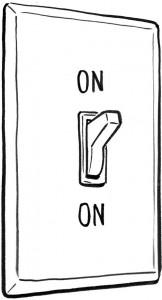Does Energy Efficiency Reduce Overall Energy Use?
< < Go Back
The Nobel Prize in Physics was awarded last week to three researchers responsible for the development of LED lighting, report Michael Shellenberger and Ted Nordhaus of the New York Times. Specifically, the Royal Swedish Academy of Sciences, which presented the award, said that replacing traditional lighting with LED lighting would “lead to a drastic reduction of electricity requirements for lighting.” The academy noted that one-fifth of the world’s electricity goes towards lighting, expecting that LEDs could reduce that figure down to just 4 percent.
But is that really the case? Shellenberger and Nordhaus say such a theory is flawed. While LEDs may reduce energy consumption on an individual basis, global energy consumption tends to increase as energy becomes more efficient. They explain:
– As America’s lighting became more efficient, moving from coal to whale oil to kerosene to the light bulb, demand for the latest energy technologies increased, raising energy consumption overall.
– Cheaper energy technology allows developing economies to access these technologies, increasing consumption.
Is increased consumption a bad thing? Not at all. Lighting efficiency has been a major contributor to economic development, the authors explain (noting that the cost of lighting in Britain has dropped by a factor of 3,000 over the last 200 years). Affordable, efficient lighting options allow people in poor and emerging economies to light their homes, increasing demand. This effect — an increase in energy consumption brought on by an increase in energy efficiency — is known as a “rebound.”
Shellenberger and Nordhaus stress that the rise in energy consumption is a positive, not a negative; LED lighting and other efficiencies allow the poor across the world to consume and access more energy.
More From NCPA:




